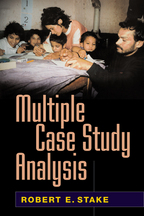Multiple Case Study Analysis
Robert E. Stake
Paperbacke-bookprint + e-book
Paperback
orderOctober 24, 2005
ISBN 9781593852481
Price: $61.00 342 Pages
Size: 6" x 9"
Reproducible worksheets that facilitate multicase recording and analysis are provided by the author.
The cover photo is taken from one of the book's featured cases from the Open Society Institute's Step by Step program. Currently operating in 30 countries, Step by Step promotes reform of teacher training systems and early education policies in partnership with governmental and nongovernmental organizations. The photo depicts parents who participated in the program at a Roma settlement in Slovakia, working with their preschool-age children at home to prepare them for school. Photo courtesy of Eva Koncoková, Wide Open School Foundation, Slovakia
The cover photo is taken from one of the book's featured cases from the Open Society Institute's Step by Step program. Currently operating in 30 countries, Step by Step promotes reform of teacher training systems and early education policies in partnership with governmental and nongovernmental organizations. The photo depicts parents who participated in the program at a Roma settlement in Slovakia, working with their preschool-age children at home to prepare them for school. Photo courtesy of Eva Koncoková, Wide Open School Foundation, Slovakia
“Researchers in education and social science have worried for decades over how to study multiple cases of the same phenomena and come up with viable conclusions. Robert Stake's careful analysis lays out the problems, the pitfalls, and the dangers of such an enterprise, and provides masterful, amply illustrated, easily understood, and reproducible solutions. All of us who study multiple sites will be grateful for this enormous gift, which analyzes and teaches simultaneously.”

—Howard S. Becker, PhD, author of Writing for Social Scientists and Tricks of the Trade
“Stake does it again: takes up a murky research problem, such as how to integrate multiple case studies that do or don’t have a common subject, and shows us how to solve it. This book could be the basis for a superb graduate seminar or simply the 'manual' for a research team facing a dozen piles of results from case studies. It would also be excellent supplementary reading for a course in qualitative research methods that would provide students with an appreciation of the difficulties and possibilities of drawing conclusions from words.”

—Les McLean, PhD, Ontario Institute for Studies in Education (Emeritus), University of Toronto, Canada
“This book fills a major gap in the qualitative research and evaluation literature. Although multicase studies are a commonly used strategy, I know of no published work that provides a comprehensive, in-depth, and practical guide to the conduct of such studies. The book embodies the author’s extensive experience and deep understanding of this approach, and manages to be both groundbreaking and user-friendly. The detailed examples of case studies are a major strength of the book. This book would be appropriate as a textbook for advanced courses in qualitative or case study research, and also as a guide and resource for practicing researchers and evaluators.”

—Joseph A. Maxwell, PhD, Graduate School of Education, George Mason University
“Stake offers a very detailed, honest, and perceptive account of the methodology of cross-case analysis, and the dilemmas of generating both the 'case' and the 'generalization.'”

—Research Professor Ian Stronach, Manchester Metropolitan University, Manchester, UK
“Stake's book provides the reader with hands-on experience in doing multicase research, offering theoretical insights, useful worksheets, and technical detail. The international Step by Step Early Childhood program implemented in Central and Eastern Europe and Central Asia is an ideal study area, with rich contextual data furnishing glimpses of the complexities of changing the patterns and ingrained practices of educational systems.”

—Henriette Heimgaertner, Bernard van Leer Foundation, The Hague, The Netherlands
—Howard S. Becker, PhD, author of Writing for Social Scientists and Tricks of the Trade
“Stake does it again: takes up a murky research problem, such as how to integrate multiple case studies that do or don’t have a common subject, and shows us how to solve it. This book could be the basis for a superb graduate seminar or simply the 'manual' for a research team facing a dozen piles of results from case studies. It would also be excellent supplementary reading for a course in qualitative research methods that would provide students with an appreciation of the difficulties and possibilities of drawing conclusions from words.”
—Les McLean, PhD, Ontario Institute for Studies in Education (Emeritus), University of Toronto, Canada
“This book fills a major gap in the qualitative research and evaluation literature. Although multicase studies are a commonly used strategy, I know of no published work that provides a comprehensive, in-depth, and practical guide to the conduct of such studies. The book embodies the author’s extensive experience and deep understanding of this approach, and manages to be both groundbreaking and user-friendly. The detailed examples of case studies are a major strength of the book. This book would be appropriate as a textbook for advanced courses in qualitative or case study research, and also as a guide and resource for practicing researchers and evaluators.”
—Joseph A. Maxwell, PhD, Graduate School of Education, George Mason University
“Stake offers a very detailed, honest, and perceptive account of the methodology of cross-case analysis, and the dilemmas of generating both the 'case' and the 'generalization.'”
—Research Professor Ian Stronach, Manchester Metropolitan University, Manchester, UK
“Stake's book provides the reader with hands-on experience in doing multicase research, offering theoretical insights, useful worksheets, and technical detail. The international Step by Step Early Childhood program implemented in Central and Eastern Europe and Central Asia is an ideal study area, with rich contextual data furnishing glimpses of the complexities of changing the patterns and ingrained practices of educational systems.”
—Henriette Heimgaertner, Bernard van Leer Foundation, The Hague, The Netherlands



